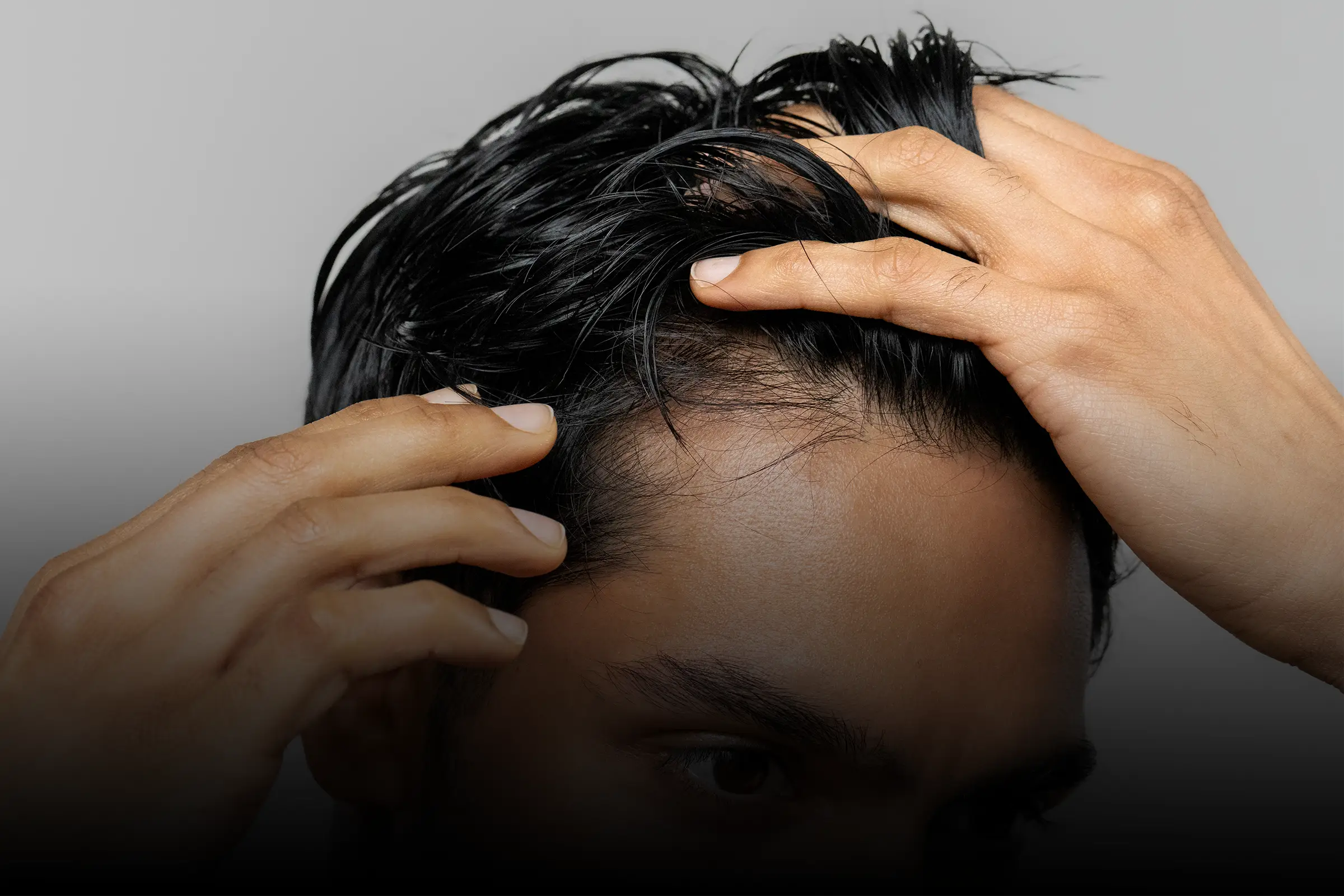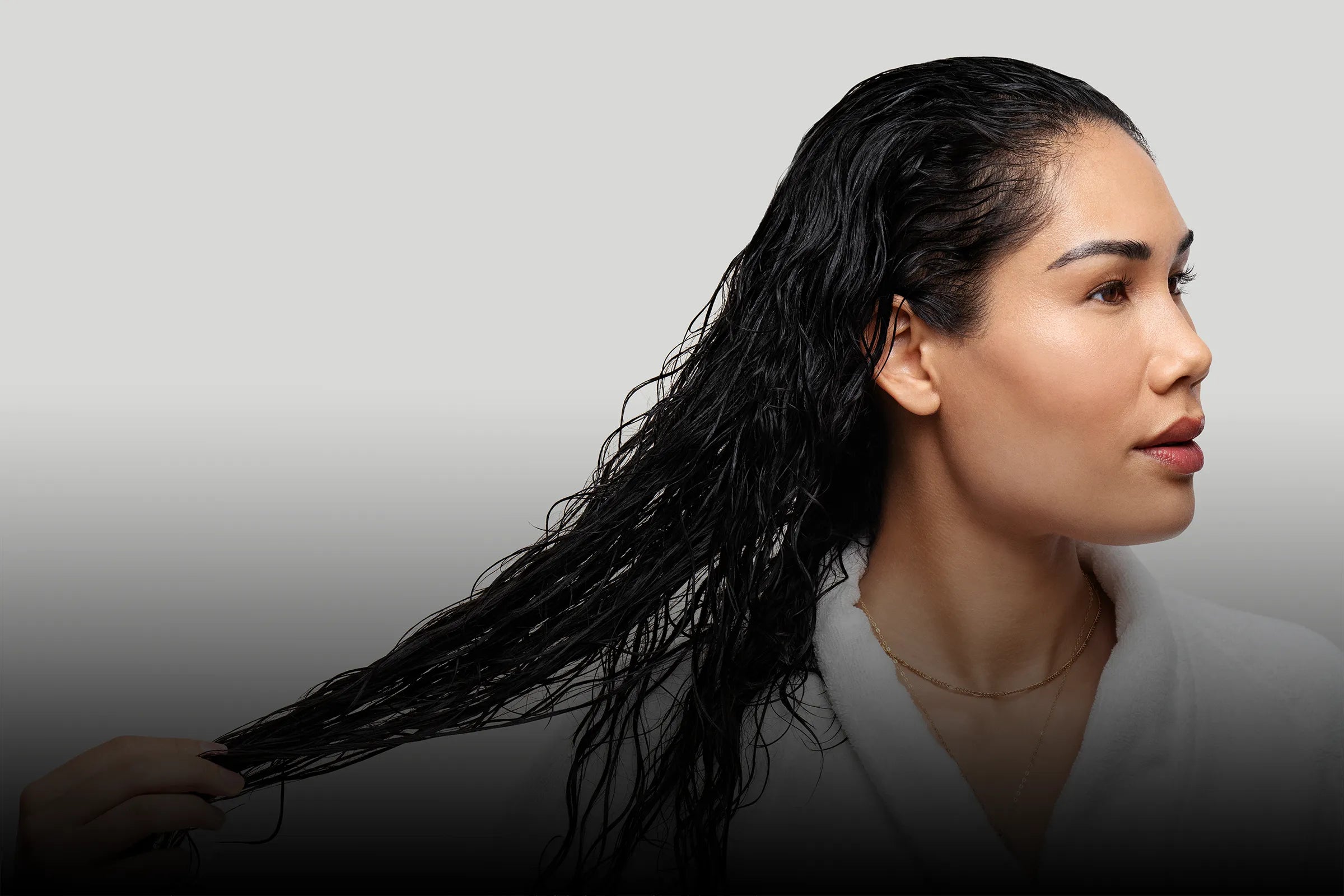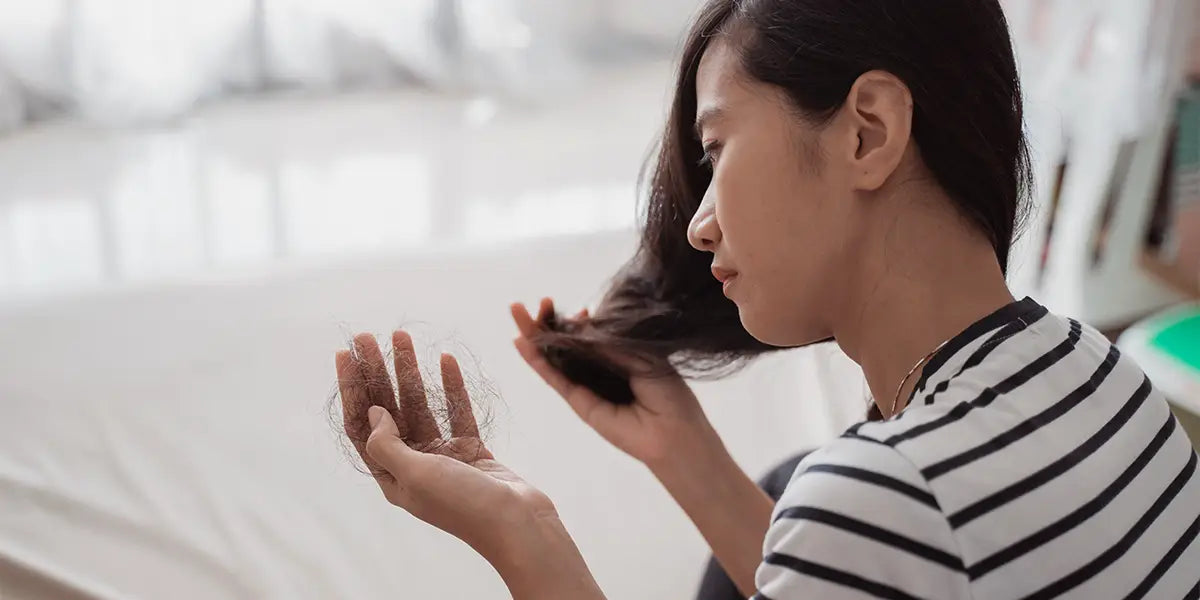Pattern hair loss has many potential causes including genetics, hormones, environmental and lifestyle factors such as diet. But can a vitamin deficiency cause hair loss? Vitamins and supplements are a popular over-the-counter option for thinning hair, but do they actually work? Which nutrients and nutrient deficiencies are the most important to hair growth in men and women? Let’s review the facts on the relationship between vitamins and pattern hair loss.
Let's make one thing clear
Although vitamins and supplements can be helpful in supporting hair growth, they cannot treat pattern hair loss when used alone. This is because micronutrients do not address the underlying biological process that causes the deterioration of hair follicles in genetically susceptible women, called hair follicle miniaturization.
Additionally, it’s not clear whether vitamins and supplements effectively stimulate hair growth in the way an agent like minoxidil can. Vitamins may, however, be important to optimizing the metabolism and creating conditions necessary for quality hair growth.
What are vitamins? How do vitamins help with hair growth?
Vitamins are micronutrients that are vital in carrying out normal cell growth and development and ensuring a strong immune system. It’s not possible to directly attribute any one micronutrient to hair growth, but some are likely more involved in the maintenance of hair and skin health.
Hair cells are some of the fastest growing in the body. Their rapid growth and turnover are coordinated by various signaling molecules, including vitamins, that help regulate the hair growth cycle.
There are 13 major vitamins: Vitamins A, C, D, E, K and eight types of Vitamin B. Except Vitamin D, which can be produced when the skin is exposed to sunlight, most vitamins need to be obtained through the diet. Below is a summary of these vitamins and their key functions in the body, hair and skin:
-
Vitamin A
Promotes eye and skin health, strengthens the immune system -
Vitamin C
Repairs cell damage and supports immunity, collagen production and absorption of iron (important in women whose hair loss is worsened by iron deficiency) -
Vitamin D
Can be made in the skin, important for the maintenance of bone, muscle and nerve growth, supports immunity and regulates inflammation as well as growth of keratin producing cells -
Vitamin E
Protects against free radicals and cellular damage -
Vitamin K
Blood clotting, tissue and bone health, keratin production -
B Vitamins
Supports metabolism, DNA and protein synthesis, maintenance of blood and nerve cell health
Which vitamin deficiency causes hair loss?
There are some micronutrient deficiencies that have been associated with hair loss. While strong conclusions can’t be drawn at this time, preliminary studies show that insufficient levels of Vitamins D, B7 (biotin) and C, together with iron can contribute to or worsen thinning hair. Let’s examine how these micronutrients influence hair growth in more detail.
Vitamin D is one of the few micronutrients that can be made by the body. It's produced when sunlight (specifically UVB radiation) interacts with molecules of 7-dehydrocholesterol in the skin. This energy changes the molecules into a form that can be further converted by the liver and kidneys into an active form of the vitamin (Almohanna et al., 2019).
It's been established that Vitamin D fulfills both anti-inflammatory and immune functions. This is important in the context of maintaining the skin barrier and healthy scalp skin, as well as protecting hair follicles against cellular damage that is often seen in autoimmune conditions. There is some evidence that inflammation is involved in the development of pattern hair loss. When immune cells enter the hair follicle in high numbers, this can cause dysfunction of the hair growth cycle (Peyravian et al., 2020). Having adequate levels of Vitamin D may help regulate the immune response to prevent this inflammation from occurring.
Two small scale studies conducted in 2013 and 2016 found a correlation between female participants presenting with pattern hair loss and decreased blood levels of D vitamins (Rasheed et al., 2013 and Banihashemi et al., 2016).
Vitamin D is also noted to influence the growth and development of keratin containing cells and it’s been observed that people who have genetic conditions that prevent Vitamin D from exerting its effects often suffer from alopecia (Almohanna et al., 2019).
Biotin is one of the most widely used and marketed supplements for hair growth. It’s believed to benefit hair by catalyzing or speeding up the chemical reactions involved in the breakdown of fats, sugars and proteins. These processes produce energy for hair cells. Biotin may also contribute to cell signaling and gene regulation. In fact, it’s also been found to have a key role in the production of keratin, a protein that gives hair and nails their structure.
There have been a few studies on biotin supplementation for the treatment of dermatological issues. Based on available data from various small scale and case studies, benefits have been observed in patients with a clinical deficiency in biotin.
One study examined the use of biotin in 18 patients with an underlying biotin deficiency that resulted in hair and/or nail abnormalities (Patel et al., 2017). These patients varied greatly in length of treatment and dosage of biotin but all experienced clinical improvement of their symptoms. While these results were generally positive, it’s important to understand that biotin deficiencies are rare and while supplementation is not generally harmful, it may be difficult to accurately gauge its role in promoting hair growth and even more so, in treating hair loss.
Of the primary vitamins, Vitamin C is probably familiar to most people. It’s a powerful antioxidant which means that it functions to prevent agents called free radicals from damaging cells and their genetic material. This helps preserve the integrity of the cells and ensures that they continue to grow and divide normally.
Since the scalp and hair are exposed regularly to sunlight which can cause oxidative damage over time, it’s possible that having enough Vitamin C can help mitigate the impact on a cellular level. In fact, at least one in vitro research study showed that application of Vitamin C to skin that had been exposed to UVB radiation could help prevent oxidative damage, protect DNA and prevent cell death (Kawashima et al., 2018).
Vitamin C levels are important because they influence absorption of iron, a mineral that many female patients find necessary to supplement their diets with. Inadequate Vitamin C has been associated with suboptimal iron absorption. This could indirectly affect hair growth, as iron deficiency has been observed in female patients with both telogen effluvium (stress induced hair loss) and pattern hair loss. Experts are still trying to understand the role played by iron in hair growth, but it may be associated with regulation of hair growth cycle dynamics.
Can low B12 cause hair loss?
Probably not. Vitamin B12, also known as cobalamin, is involved in metabolic processes as well as DNA and protein synthesis. For these reasons, it’s been hypothesized that B12 may be important to rapidly dividing cells like hair cells and that a deficiency could cause hair loss.
At this time, hair loss has not been directly associated with low Vitamin B12 levels. In fact, two studies conducted in Turkish populations that compared blood concentrations of B12 in participants with and without hair loss due to alopecia areata (an autoimmune hair loss disorder) found no significant differences in the micronutrient between affected and healthy individuals (Gonul et al., 2009 and Ertugrul et al., 2013).
So, while a deficiency in Vitamin B12 may not cause you to lose your hair, you could experience a host of other symptoms such as anemia (low red blood cell count) and other potentially serious neurological and psychological symptoms such as depression. A deficiency in this micronutrient (and any of the others discussed in this article) should be investigated by a healthcare professional.
Vitamin deficiency and hair loss: Takeaway
Vitamins and supplements for hair growth is an area of continuing research. While some early data suggests that some vitamins such as Vitamin D may be very important in the maintenance of hair and scalp health, the fact remains that there is considerable debate within the scientific community about the usefulness of taking supplements to treat a specific issue like pattern hair loss.
Clinically significant nutritional deficiencies are rare within the general population and if they do occur, they're typically accompanied by other health challenges in addition to hair loss. For the average person, taking too much of a vitamin or mineral can be a risk and have serious health effects.
Having said that, if you are concerned about nutrition, we recommend that you connect with registered dietician or your doctor for an assessment. If it’s confirmed that nutrition isn’t an issue and that you are suffering from female pattern hair loss, take heart that there are treatment options such as minoxidil and spironolactone that have been used specifically for their benefits to female hair loss.

























